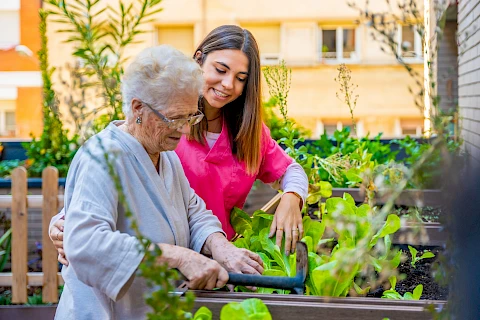
Gardening is not just a pastime. It's a therapeutic activity, particularly for seniors. The physical movements, sunshine, and the satisfaction of watching something grow have immense physical, mental, and emotional benefits for older adults. However, tending to a garden can become challenging with age. With creativity, adaptability, and adequate resources, you can make gardening an accessible and enjoyable activity for your senior loved ones, regardless of their limitations.
The Benefits of Gardening for Senior
Gardening offers a multitude of benefits for seniors, starting with the physical. Bending, lifting, and digging can significantly aid in increasing mobility, building strength, and enhancing balance. Mentally, the repetitive and focused nature of gardening tasks can help improve focus and memory, often sharpening cognitive functions. Emotionally, gardening can be a powerful stress reducer. The sight of greenery, the sunshine, and the sense of accomplishment of seeing plants thrive can uplift the spirit, giving seniors a joyous purpose.
Making Gardening Accessible for Seniors
With age, gardening can present some physical challenges. However, modifications and adaptations can make this beloved activity accessible to older adults. Ensuring comfort and safety in the garden requires understanding the senior’s needs and limitations. This is where adaptive gardening comes into play.
Caregiver Strategies for Adaptive Gardening
With the right strategy, you can make gardening safer and less taxing for your senior loved one:
Raised Bed
One of the most significant aspects of adaptive gardening for seniors is using raised beds. They provide a more manageable height for seniors to plant, weed, water, and harvest without too much bending or stooping. Raised beds are also aesthetically pleasing, adding a new dimension and depth to the garden.
Adaptive Tools
Adaptive gardening tools can help minimize strain and make gardening tasks easier. Options include long-handled tools, lightweight watering cans, and ergonomic pruning shears. These tools can help seniors perform gardening tasks without causing harm or injury to themselves.
Small Manageable Tasks
Breaking tasks into manageable steps can help seniors avoid feeling overwhelmed. A large project can seem daunting and physically strenuous to an older adult. Consider breaking down these tasks into smaller, manageable steps. Have them focus on weeding one day or plant a few pots at a time. This helps prevent fatigue while allowing seniors to enjoy gardening at their own pace.
The Role of Caregivers in Adaptive Gardening
Caregivers play an instrumental role in adaptive gardening. You can support your senior loved one in the more physical aspects of gardening, lifting heavy stuff, or helping them around uneven terrain. Your emotional support can help encourage them to enjoy their time in the garden. You can also share the joy of gardening with your senior loved one, making it a fulfilling collaborative activity you both enjoy.
Get Gardening Assistance From Senior Helpers Greenwood-Aiken, SC
Adaptive gardening is a valuable concept that can enrich the lives of seniors. With support and assistance, you can encourage seniors to nurture their green thumb in their golden years.
If you can use an extra pair of hands looking after a senior loved one in Aiken, Greenwood, North Augusta, Chapin, and Leesville, Senior Helpers Greenwood-Aiken, SC, can help. We provide professional in-home senior care solutions, including personal care, companionship, help with gardening, and more. Contact us to learn more!